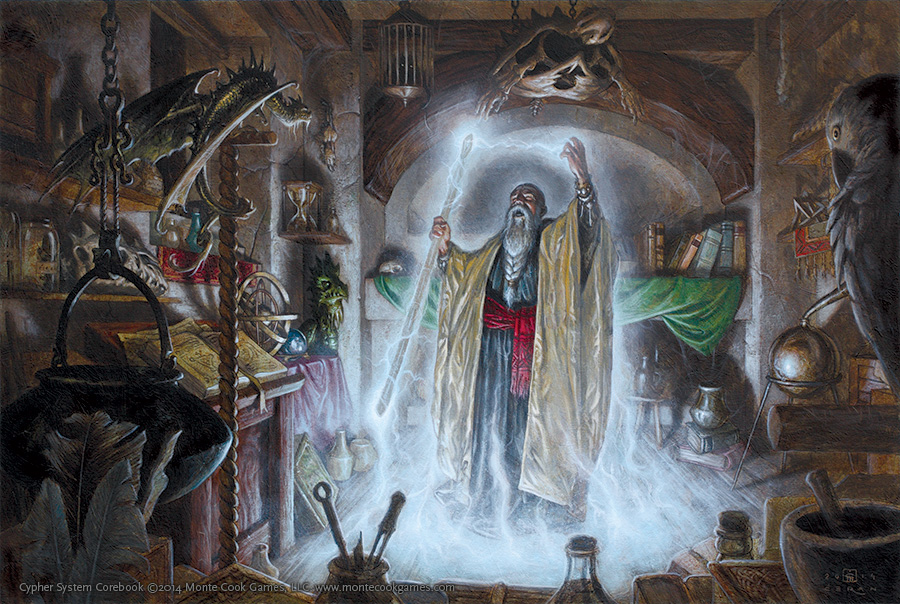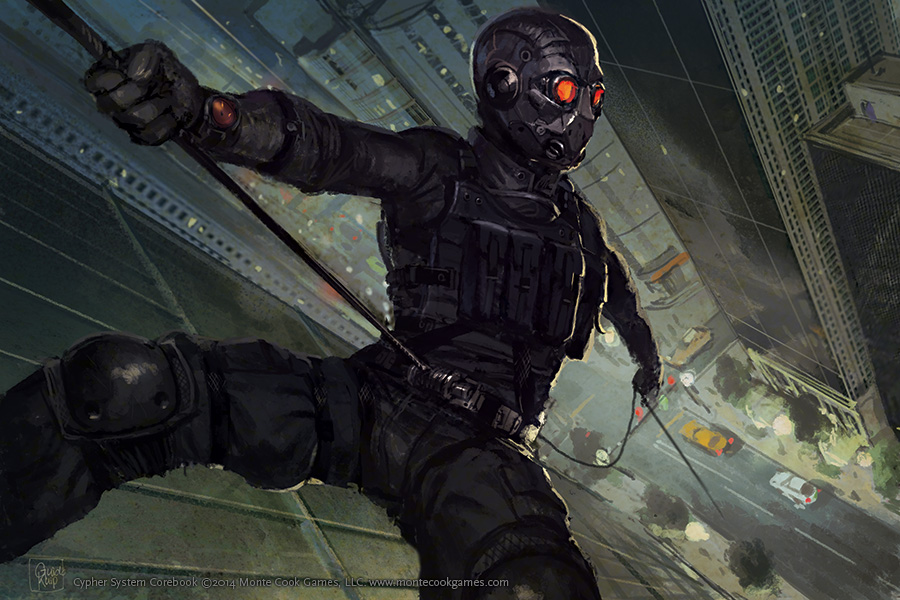Everything about the Cypher System is focused on making great characters, adventures, and campaigns. The flexibility of the system frees the GM to build the adventures they imagine with a focus on creativity over “work,” and the GM intrusion mechanic enables great plot twists that the players welcome rather than shy away from.
For their part, the players call upon resources such as Effort, player intrusions, and flexible uses of XP to influence the course of the game and bring advantages to the rolls and situations they see as most important. And character arcs let players bring their own priorities to the game, developing satisfying and engaging subplots in collaboration with the GM.
Resolving Tasks
Cypher System gameplay involves a simple die roll to determines success or failure in any kind of action. The GM assigns a difficulty on a scale of 1 to 10—a 1 is extremely simple, while a 10 represents a herculean task beyond the means of most mortals. Once the GM has assigned this difficulty, the rest is up to the players.
Players apply their skills and experience, tools or other advantages, aid from one another, and other assets to reduce this difficulty. They can also focus a limited resource called Effort to further lower the difficulty of actions really important to them.
Once a player has reduced the difficulty as much as they are able, they roll a d20. The target number is equal to three times the difficulty.
This system resolves every task, including combat. Creatures and NPCs have levels, and an opponent’s level is the difficulty of any task it opposes. (There’s more on this under Running the Cypher System.)
Pools
Every character has a set of three Pools, representing Intellect, Speed, and Might. Characters spend points from their Pools to apply Effort to a roll, and sometimes to power their special abilities. Damage also affects Pools. Other than the Pools, characters are not defined by numerical stats.
Experience Points
Characters earn Experience Points—XP—when they make new, interesting discoveries or otherwise succeed in the objectives of their adventures. (Killing things is not directly related to XP, although combat is often necessary to make discoveries and accomplish missions). They also earn XP when the GM “intrudes” on the action of the game to introduce new complications. Lastly, players have the ability to award XP to other players for great ideas, useful actions, or other reasons.
XP can be spent to increase character abilities, or to affect events in the game (such as rerolling dice), gain short-term benefits, or advance in tier.

Cyphers
Cyphers (not surprisingly, given the name) lie at the heart of the Cypher System. Cyphers are one-use abilities that characters gain over the course of play. In many games, these come in the form of items, like magic potions or bits of alien technology. In others, they’re more esoteric, like inspirations or divine blessings. Cyphers are designed for frequent discovery and use. PCs can have only a small number of cyphers at a given time, and since they’re always finding more, they’re encouraged to use them at a steady pace.
Why cyphers? Characters in the Cypher System—as in pretty much every RPG—have abilities that rarely or never change and can always be counted on. Cyphers give them additional abilities that are ever-changing and inject a great deal of variability in play. They help ensure that no game session ever feels just like the last, and that characters always remain dynamic. This week your character can solve the problem by walking through walls, but last time it was because you could create an explosion that would level a city block.
Potions or scrolls? Amulets or smartphone viruses? Crystals, gadgets, or mind-warping words from forbidden tomes? The blessings of a supernatural being, or bits of alien technology left behind by long-forgotten transdimensional civilizations? Cyphers in your campaign can take any of a thousand different forms.
Running the Cypher System
The Cypher System has been uniquely designed to make things easy on the GM. The goal is to decrease the amount of time the GM spends juggling game stats, and allow them to instead focus entirely on the story and the action at hand. Creatures, NPCs, and entire encounters are incredibly easy to make up on the fly—and even easier to run—but they still present vivid, varied, and interesting challenges.
In combat, for example, an opponent’s level determines the difficulty to attack it, and to defend against its attacks. (Or anything else for that matter—tricking it, talking it into something, seeing through its deceptions, and so on.) That doesn’t mean opponents are necessarily one-dimensional: A level 3 creature might make attacks with its fire whip as though it was level 5, but defend against mental attacks as if it was level 2. The design focus, though, is on a creature’s motivations, tactics, and interesting abilities, rather than a large block of statistical information. This frees the GM’s attention to focus on using creatures, story elements, the game environment, and so on in a creative manner, rather than on modifiers and numerical details.
In short, the Cypher System’s game engine elegantly keeps the focus on story and action, without sacrificing structure or mechanical detail.



